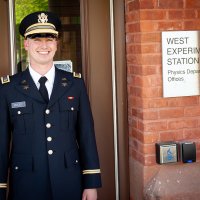
The war in Ukraine has put the specter of cyberattacks squarely back on the map, especially after the attack on European satellites severely hampered Ukrainian intelligence gathering.
But who’s protecting us from such attacks and what special training do they need? The story of Jack Moody, a recent graduate from the University of Massachusetts Amherst and its iCons Program, answers this important question.
Moody is a commissioned Cyber Operations Officer in the United States Army, and in this role plans, coordinates, and oversees offensive and defensive cyber operations for the Army and the Department of Defense. It’s an intense job that requires thinking on your feet and stepping easily into leadership positions. Moody credits his time in the iCons program at UMass Amherst with fostering the specific technical and leadership skills that helped him qualify for this job.
“I learned from the iCons program that motivated students can learn and cultivate skills that will make them amazing scientists as well as leaders in the scientific community,” explains Moody. “This is what excites me and pushes me forward always — I want to lead, inspire, and learn.”
According to Today’s Military, the field of cyber operations involves using specialized technology to both defend from and target the tech capabilities of hostile adversaries. This has become a critical role in the United States military in light of increased hacking attempts and cyberattacks by hostile entities against the federal government.
![]() Moody takes great pride in his job and enjoys the responsibility that is placed on him and his co-workers to protect national data, networks, and other systems. He also looks forward to eventually representing his team’s ideas to high-ranking officials, work he likens to his experience in the iCons program.
Moody takes great pride in his job and enjoys the responsibility that is placed on him and his co-workers to protect national data, networks, and other systems. He also looks forward to eventually representing his team’s ideas to high-ranking officials, work he likens to his experience in the iCons program.
“In the second year of the iCons program, I had to learn how to stand in front of highly educated and ranked people and pitch my team’s ideas,” Moody remembers. “We even pitched to Chancellor Subbaswamy and the Carbon Net-Zero committee! This is similar to my job in the Army — many of the soldiers and civilians that I work with are highly competent and well-educated, and it’s my job to communicate well with them, understand their needs, and translate those needs and our mission across the echelons of command.”
If Moody comes across as highly confident and optimistic in his abilities, he doesn’t come by that confidence easily. A first-generation university student who was adopted only a few months before starting at UMass, Moody struggled to find a community of peers during his freshman year and did not think that he would do well in his chosen major of physics. It was only when he was accepted into the iCons program his freshman year and then selected as team lead for projects in his second and third years in the program that he realized he had the ambition and talent to serve as a group leader.
“While in iCons, I had to combine research and teamwork to devise plans for tackling real, serious problems affecting people’s health and the environment,” says Moody. “This experience helped me learn that I really enjoy a challenge and that I especially enjoy leading teams in solving difficult problems.”
Moody joined Army ROTC his sophomore year of college and in his junior year, he applied for and was accepted to internships with the American Physical Society and with the Nuclear Science and Engineering Research Center in the United States Military Academy at West Point, where he worked with the Defense Threat Reduction Agency (DTRA) and Leidos. The iCons program deepened the connection between his work experience and education by encouraging him to use his internship research at Leidos as the basis for his senior thesis.
The combination of his iCons experience, internships, and military training has led Moody to establish the foundation for a serious career in the military.
“The lessons I learned in iCons about how to lead and communicate effectively have helped me get as far as I have, and I will keep reflecting on those experiences so that I can be the best leader possible in the future.”
Stay Connected